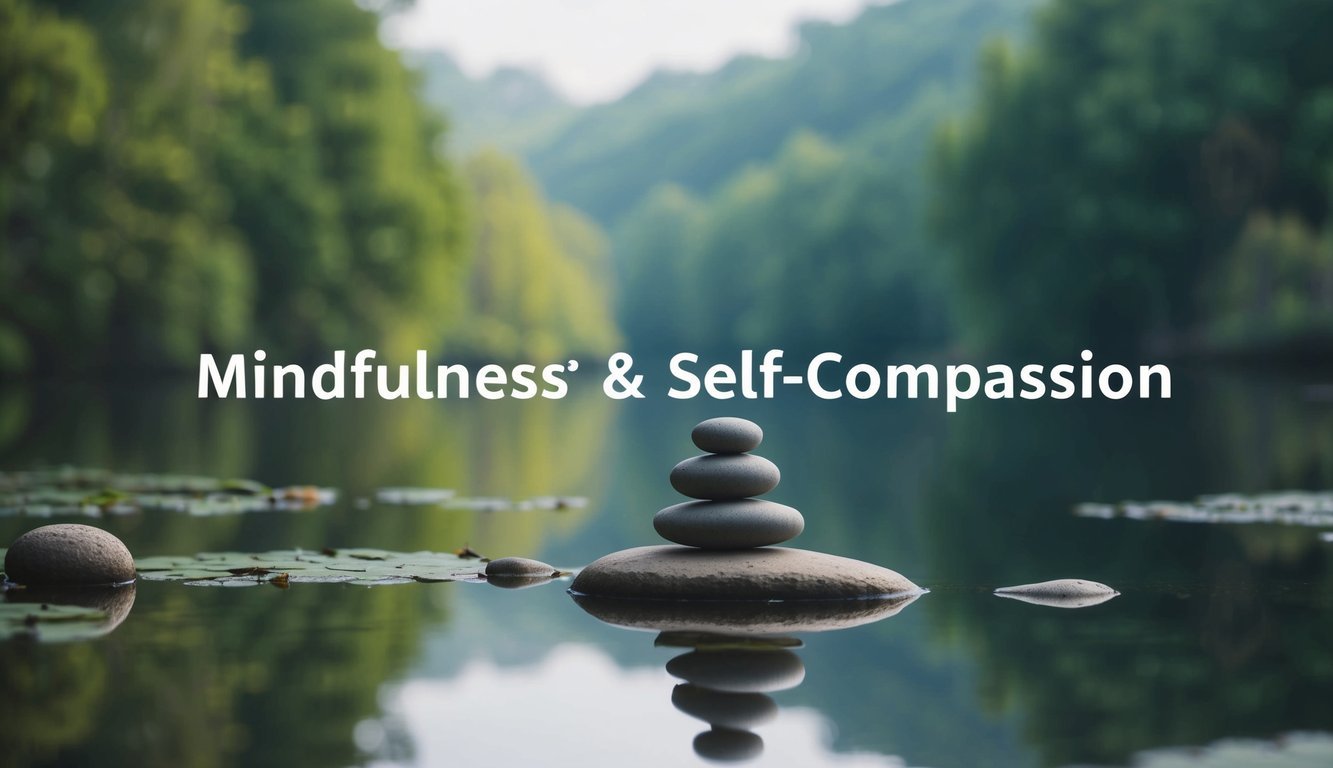PsychNewsDaily Publishers
100 Summit Drive
Burlington, MA, 01803
Telephone: (320) 349-2484
PsychNewsDaily Publishers
100 Summit Drive
Burlington, MA, 01803
Telephone: (320) 349-2484

Mindful self-compassion (MSC) is a practice that blends mindfulness and self-kindness. It teaches people how to treat themselves with the same care and understanding that they would offer a friend. By learning to be less critical and more supportive, individuals can better handle challenges and difficult emotions in their daily lives.
MSC training includes various techniques, such as guided meditations and exercises that help cultivate self-compassion. This training can lead to reduced stress, greater emotional resilience, and an overall improved sense of well-being. Many find that by practicing these skills regularly, they become more mindful in their interactions and better equipped to deal with life’s ups and downs.
For those curious about how to incorporate these methods, there are structured programs available. Participants often appreciate the supportive environment of learning alongside others. As they engage with the MSC course content, they gain practical tools that can make a meaningful difference in their lives.

Mindful Self-Compassion (MSC) is a practice that intertwines self-kindness with mindfulness. It aims to enhance emotional well-being by helping individuals respond to difficult times with care and understanding. This section explores its history, key principles, and the vital role of mindfulness in fostering self-compassion.
Mindful Self-Compassion was developed through the work of Kristin Neff and Christopher K. Germer. They combined ancient wisdom with modern psychology. Neff introduced the concept of self-compassion in the early 2000s. Her research highlighted three main components: self-kindness, common humanity, and mindfulness.
Germer contributed by creating structured programs to teach these ideas. Together, they designed an 8-week course that became widely recognized. This program has helped many people improve their emotional resilience and cope with life’s challenges.
There are three core components of Mindful Self-Compassion:
Self-Kindness: This means treating oneself with care and understanding instead of harsh criticism. It encourages individuals to be gentle with themselves in times of suffering.
Common Humanity: This principle recognizes that suffering and feelings of inadequacy are part of the shared human experience. It helps individuals feel connected to others, reducing feelings of isolation.
Mindfulness: This is the practice of staying present and aware of thoughts and feelings without judgment. It plays a crucial role in balancing self-compassion and ensuring that individuals do not become overwhelmed by emotions.
Mindfulness practice is central to Mindful Self-Compassion. It encourages individuals to observe their thoughts and feelings without getting swept away. This awareness helps in recognizing negative self-talk and emotional pain.
Through mindfulness, people learn to respond to discomfort with kindness rather than fear or avoidance. This approach allows for a more balanced perspective during tough situations.
By incorporating mindfulness, individuals can develop greater emotional resilience. They can face life’s difficulties with compassion and strength. This practice promotes a healthier mindset and contributes to overall well-being.

The Mindful Self-Compassion (MSC) program is designed to help individuals cultivate self-compassion through structured learning and practice. It includes specific components aimed at building skills and integrating these practices into daily life.
The MSC core curriculum typically spans eight weeks. Each week, participants engage in sessions that focus on different aspects of mindfulness and self-compassion.
Key components include:
The combination of these elements helps create a comprehensive understanding of mindful self-compassion.
Home practice is a vital part of the MSC training program. Participants are encouraged to engage in exercises outside of class to deepen their learning.
Essential aspects of home practice include:
These practices ensure that lessons learned in the classroom make a real impact in everyday life.
Becoming an MSC teacher involves a detailed training process. This training ensures that instructors have a strong foundation in both mindful practices and self-compassion.
Key steps include:
This structured training equips teachers to effectively share MSC principles with others.

Mindful Self-Compassion (MSC) offers valuable tools for navigating life’s challenges. By understanding how to integrate MSC into daily life, individuals can cultivate emotional resilience and strengthen their personal relationships.
To apply MSC in everyday situations, one can practice self-compassionate thinking. When facing difficult emotions like anxiety or stress, individuals can pause, breathe, and recognize their feelings without judgment. This practice can include simple affirmations such as, “It’s okay to feel this way.”
Engaging in mindfulness exercises, such as meditation or journaling, can also help. Noticing small moments of joy and savoring them fosters a sense of appreciation. Creating a self-care routine can further encourage these practices, allowing for a structured approach to incorporating MSC into daily life.
Emotional resilience is the ability to bounce back from tough times. With MSC, one learns to respond to difficult emotions with kindness instead of criticism. For instance, when feelings of sadness or frustration arise, individuals can remind themselves that these feelings are part of being human.
They can practice self-soothing techniques like deep breathing or positive visualization. Keeping a gratitude list also helps, as focusing on positive aspects can shift perspective. Building this resilience reduces the chances of falling into depression or prolonged anxiety.
MSC can greatly enhance personal relationships. When individuals practice self-compassion, they are better equipped to show compassion to others. This creates a supportive environment where both partners can express their emotions openly.
Communication plays a key role. Using “I” statements can help in sharing feelings without blame. For example, saying “I feel overwhelmed” instead of “You make me feel overwhelmed” fosters understanding. Furthermore, being present and actively listening to loved ones strengthens the emotional bond, making relationships more fulfilling and resilient against stress.

This section covers important ideas within Mindful Self-Compassion (MSC) training. These concepts focus on enhancing self-validation, self-kindness, and emotional strength.
Self-validation is about recognizing and accepting one’s feelings and thoughts. It’s crucial in MSC because it forms the basis for true self-compassion.
Practicing mindful awareness helps individuals notice their feelings without judgment. They can acknowledge stress or sadness as real, which reduces self-criticism.
When someone feels inadequate, self-validation allows them to understand that their feelings are valid. Instead of dismissing emotions, they learn to embrace them.
Also, using techniques like journaling can be beneficial. Writing down feelings helps solidify the practice of self-validation.
Self-kindness is about treating oneself with care rather than harsh criticism. Many people tend to be hard on themselves during tough times.
In MSC training, individuals learn to replace negative self-talk with fierce self-compassion. This means being supportive and understanding, as they would to a friend.
For example, when facing failure, rather than thinking, “I’m such a failure,” they might say, “It’s okay to make mistakes. I’m learning.”
Practicing compassion in small daily activities can reinforce self-kindness. This could be as simple as taking a moment to breathe and appreciate oneself.
Emotional strength is the ability to cope with life’s challenges. In MSC, it’s important to develop this resilience to overcome self-criticism.
When individuals practice self-compassion, they find a safe space to explore their emotions. They learn that showing vulnerability is a sign of strength, not weakness.
Acceptance of one’s flaws and struggles is also vital. Rather than fighting against feelings of inadequacy, they learn to accept these feelings as part of the human experience.
Engaging in mindfulness practices regularly helps build this strength. It prepares individuals to face emotional difficulties with courage and grace.

Participants in Mindful Self-Compassion (MSC) training can access various support and resources to enhance their journey. These options include finding qualified teachers, scholarship opportunities, and connecting with communities of peers.
Finding a certified MSC teacher is an essential step for participants. The Center for Mindful Self-Compassion (CMS) offers a directory of trained teachers. These professionals have completed rigorous training and are skilled in guiding participants.
Students can search for teachers based on location or availability for live online MSC sessions. Many teachers provide tailored support to help individuals navigate their practice. Having a knowledgeable teacher can make a significant difference in deepening one’s understanding and practice of self-compassion.
Participants may face financial barriers when seeking MSC training. To address this, CMS offers scholarship opportunities. Interested individuals can submit a scholarship application outlining their financial situation and need for support.
These scholarships can reduce costs for workshops, training sessions, or silent retreats. This effort ensures that everyone has a chance to benefit from the MSC program, regardless of their financial circumstances. It promotes inclusivity and access to self-compassion training.
Community support plays a crucial role in the MSC journey. Participants can connect with others by joining local or virtual groups. Peer support creates a warm and supportive environment, allowing individuals to share experiences and practice together.
The CMS community provides resources and forums for participants to communicate and build connections. Engaging with others who share similar goals can lead to lasting friendships and encouragement. Many find it helpful to have a warm and supportive companion during their MSC training.

Mindful self-compassion training often raises several common questions. These questions cover the program structure, free access options, course topics, reliable online resources, teacher training, and available workbooks.
The program usually consists of guided meditations, experiential exercises, and discussions. Participants learn tools to develop self-compassion and mindfulness skills. These elements help individuals strengthen their emotional resilience.
Many organizations offer free resources online. Websites like self-compassion.org provide materials, guided meditations, and even virtual courses. These options allow individuals to practice mindful self-compassion without any costs.
An 8-week course covers essential topics such as self-kindness, mindfulness, and common humanity. Participants explore ways to manage difficult emotions and practice self-care. Each week builds on skills to enhance participants’ understanding and application of self-compassion.
Reliable programs can be found on sites like the Center for Mindful Self-Compassion and other mindfulness organizations. They often list accredited courses and experienced instructors. Checking reviews and testimonials can help confirm the program’s effectiveness.
Yes, specific teacher training courses exist for those who want to lead mindful self-compassion sessions. These programs typically require prior experience with mindfulness practices. Completing such a course equips individuals with the skills needed to teach others.
You can find a workbook titled “The Mindful Self-Compassion Workbook.” It is available for individuals looking for structured guidance. This resource often includes exercises and practices that complement the training.